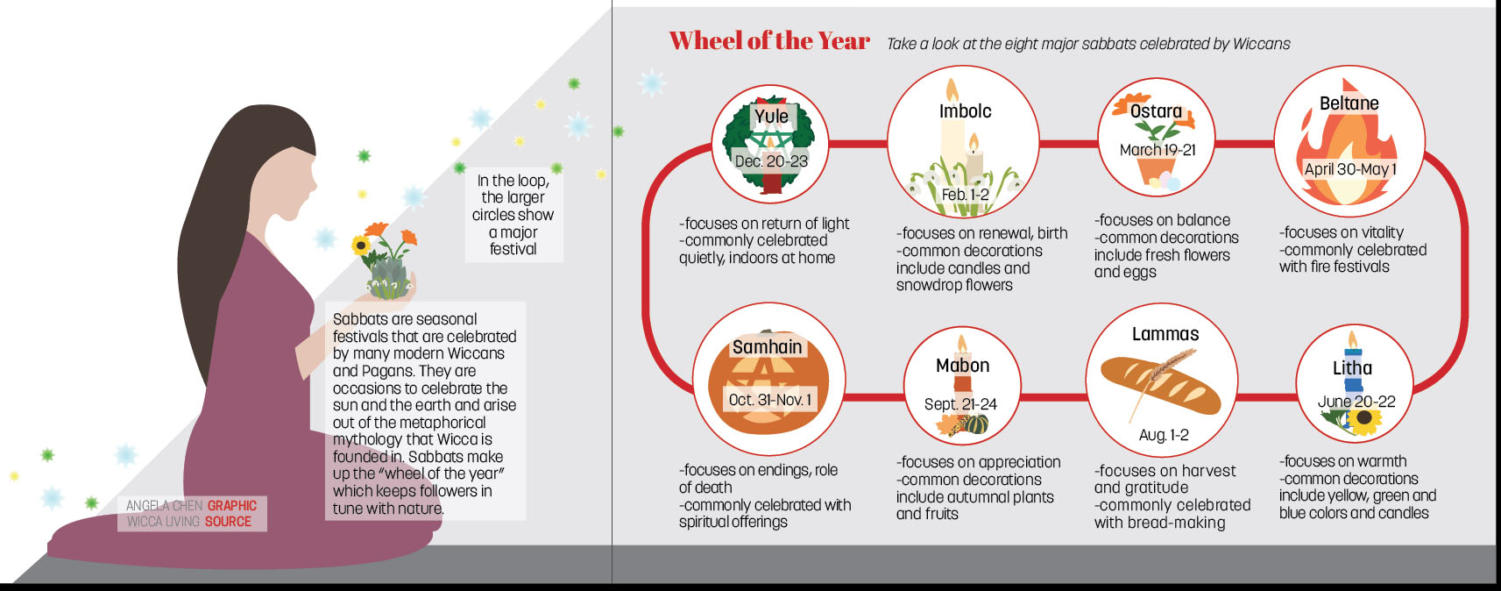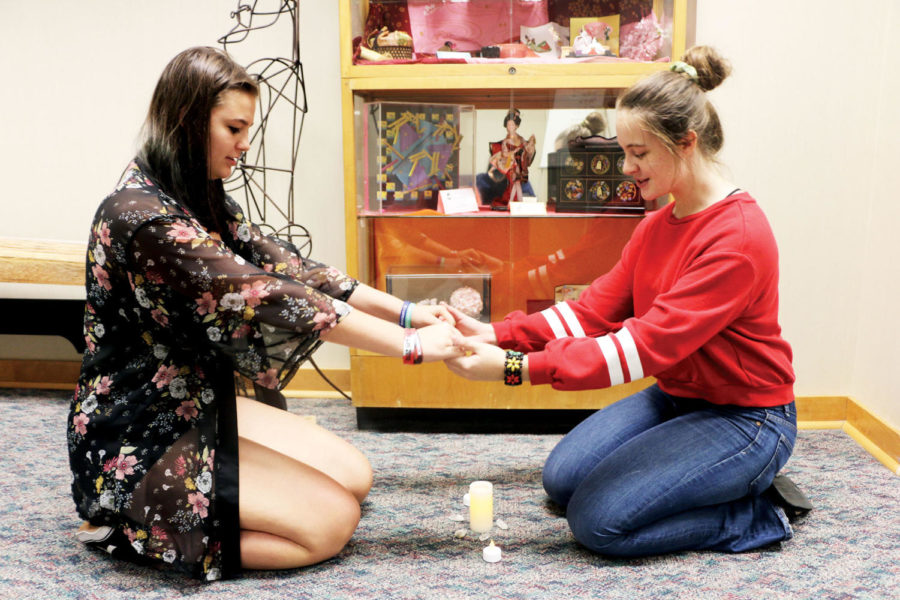Many people associate the word “Wicca” with witchcraft and characteristics such as “evil” or “Satanic,” while others see Wiccan practices as similar to those of cults. Few people picture a 16-year-old girl walking down the street, registering a goddess in the world around her as she says small prayers, gives thanks to the Earth and wears crystals to draw positive energy from nature. But for junior Olivia “Via” Sarjent, this is a part of her everyday life experience and with it come the stereotypes of being a practicing Wicca.
“People usually get Wicca and ‘witchcraft’ mixed up,” Sarjent said. “Wicca is religion based in nature and worships a mother goddess and a horned god, while witchcraft is its own separate thing. (Witchcraft is) doing spells and charms and stuff, and (Wicca and witchcraft) go really hand in hand, which is why people think that they’re the same a lot, but for me (the Wiccan religion is) an easy going kind of like nature-y kind of thing that I have going on in my life where I know that it’s something I can rely on. It’s definitely not evil like people say (when I ask what) they think about it.”
The Wiccan religion was founded in the 1950s by Gerald Gardner as a form of modern Paganism. Over time, it has become a largely female-dominated religion. This is what Sarjent said drew her into Wiccan practices.
“I first discovered Wicca because I grew up in a household that wasn’t overly religious but still had a lot of Christian beliefs and values put into life,” Sarjent said. “I never really agreed or felt like I connected well with those beliefs and values and so I went on to research other religions and read books on them and stuff. I found one (religion); I found Wicca, which I just felt fit me very nicely.”
Junior Skylar Greaves’ experience is similar to Sarjent’s, as she said she discovered Wicca through research as well.
“I read a lot and a lot of my books are about magic and alternative religions,” Greaves said. “A lot of the stories I read were about Paganism so I started researching a little bit about it and I found out about Wicca and I really like the ideas behind the practices and the beliefs that they have.”
According to Sarjent and Greaves, Wicca is an individual practice, with only a few shared characteristics from person to person: a goddess as their main deity, a 366-day training period to fully understand Wiccan practices, the threefold rule, which states “anything you do to harm others will come back to you threefold” and the Wiccan creed, which states, “In ye do what ye will but will not harm none.” Wiccan beliefs can range from polytheism to pantheism and even to monotheism.
Greaves said she is drawn in by the individualistic aspects of Wicca. She said she likes the freedom to believe what she wants to instead of having to follow a specific set of rules and regulations.
“I generally follow eclectic Wicca, which is where you kind of make (the rules) for yourself,” Greaves said. “You take from each different practice and pull it all together. You can choose what you believe rather than having to adhere to something strict. I like to be open to everything so I will accept what (someone) believes and I’ll take that into consideration. I do practice with two other girls and we have to agree on everything that we want to include.”
Both Greaves and Sarjent said Wiccan practices have had a positive impact on their lives, encouraging them to be a source of positivity to others and find the good in their everyday routines.
“(Wiccan practices) really made me see things in a different way because I (try) to find more of the good in things and see how I could put good back into the universe because Wicca is all about taking universal energies and making them good and putting them towards something helpful,” Greaves said.
Deb Burton, a teacher at the Magic Candle, a shop and school dedicated to helping others learn about Wicca and Paganism, said she agrees Wiccan practices are more helpful than harmful. While Burton is not a Wiccan herself, she follows Paganism, a religion similar and often confused with Wicca.
“I consider myself Pagan more than Wiccan,” Burton said. “It’s an earth-based path that I walk which means I honor the Earth and work with its nature and energy. It’s a spiritual path, so it would be considered my religion.”
Burton said she discovered Paganism through researching herbs and investigating how to give back to the Earth, which led her to the Magic Candle. She said as she became more comfortable on her own path, teaching became a natural next step for her. However, her journey did not come without hardships.
“The hardest part is reflecting back on my experiences and looking within at who I really am and I what I gained from those experiences and forgiving people, especially myself,” Burton said. “(I’ve been) working through guilt. I am releasing that and I have to control everything.”
Burton also said she recognizes there are difficulties when explaining Wicca and Paganism to others due to stereotypes of the religions.
“I think there’s a lot of negative reactions to (Wicca and Paganism),” Burton said. “A lot of people see it as devil worship and it isn’t. I see Hollywood giving people the idea that you can twitch your nose and get your house cleaned and it’s not the way it is. It is a loving religion and (follows) more along the lines of giving back.”
Sarjent said she admits she has faced hardships on her journey as well, but she finds the pros outweigh the cons.
“Every time I mention (I’m Wiccan) to somebody, their first thing is, ‘Oh my gosh, that’s so weird,’” Sarjent said. “Like, ‘What are you doing with your life?’ So I feel like I have to explain myself more often. But I feel like overall, it’s just been really good and it’s nice to have something I just really believe in and can work towards.”


































![AI in films like "The Brutalist" is convenient, but shouldn’t take priority [opinion]](https://hilite.org/wp-content/uploads/2025/02/catherine-cover-1200x471.jpg)










































![Review: “The Immortal Soul Salvage Yard:” A criminally underrated poetry collection [MUSE]](https://hilite.org/wp-content/uploads/2025/03/71cju6TvqmL._AC_UF10001000_QL80_.jpg)
![Review: "Dog Man" is Unapologetically Chaotic [MUSE]](https://hilite.org/wp-content/uploads/2025/03/dogman-1200x700.jpg)
![Review: "Ne Zha 2": The WeChat family reunion I didn’t know I needed [MUSE]](https://hilite.org/wp-content/uploads/2025/03/unnamed-4.png)
![Review in Print: Maripaz Villar brings a delightfully unique style to the world of WEBTOON [MUSE]](https://hilite.org/wp-content/uploads/2023/12/maripazcover-1200x960.jpg)
![Review: “The Sword of Kaigen” is a masterpiece [MUSE]](https://hilite.org/wp-content/uploads/2023/11/Screenshot-2023-11-26-201051.png)
![Review: Gateron Oil Kings, great linear switches, okay price [MUSE]](https://hilite.org/wp-content/uploads/2023/11/Screenshot-2023-11-26-200553.png)
![Review: “A Haunting in Venice” is a significant improvement from other Agatha Christie adaptations [MUSE]](https://hilite.org/wp-content/uploads/2023/11/e7ee2938a6d422669771bce6d8088521.jpg)
![Review: A Thanksgiving story from elementary school, still just as interesting [MUSE]](https://hilite.org/wp-content/uploads/2023/11/Screenshot-2023-11-26-195514-987x1200.png)
![Review: "When I Fly Towards You", cute, uplifting youth drama [MUSE]](https://hilite.org/wp-content/uploads/2023/09/When-I-Fly-Towards-You-Chinese-drama.png)
![Postcards from Muse: Hawaii Travel Diary [MUSE]](https://hilite.org/wp-content/uploads/2023/09/My-project-1-1200x1200.jpg)
![Review: "Ladybug & Cat Noir: The Movie," departure from original show [MUSE]](https://hilite.org/wp-content/uploads/2023/09/Ladybug__Cat_Noir_-_The_Movie_poster.jpg)
![Review in Print: "Hidden Love" is the cute, uplifting drama everyone needs [MUSE]](https://hilite.org/wp-content/uploads/2023/09/hiddenlovecover-e1693597208225-1030x1200.png)
![Review in Print: "Heartstopper" is the heartwarming queer romance we all need [MUSE]](https://hilite.org/wp-content/uploads/2023/08/museheartstoppercover-1200x654.png)





